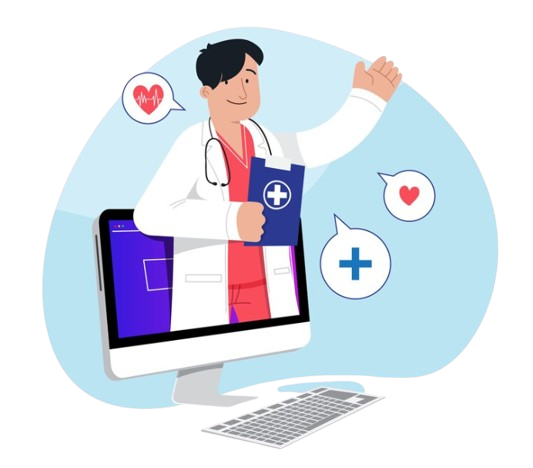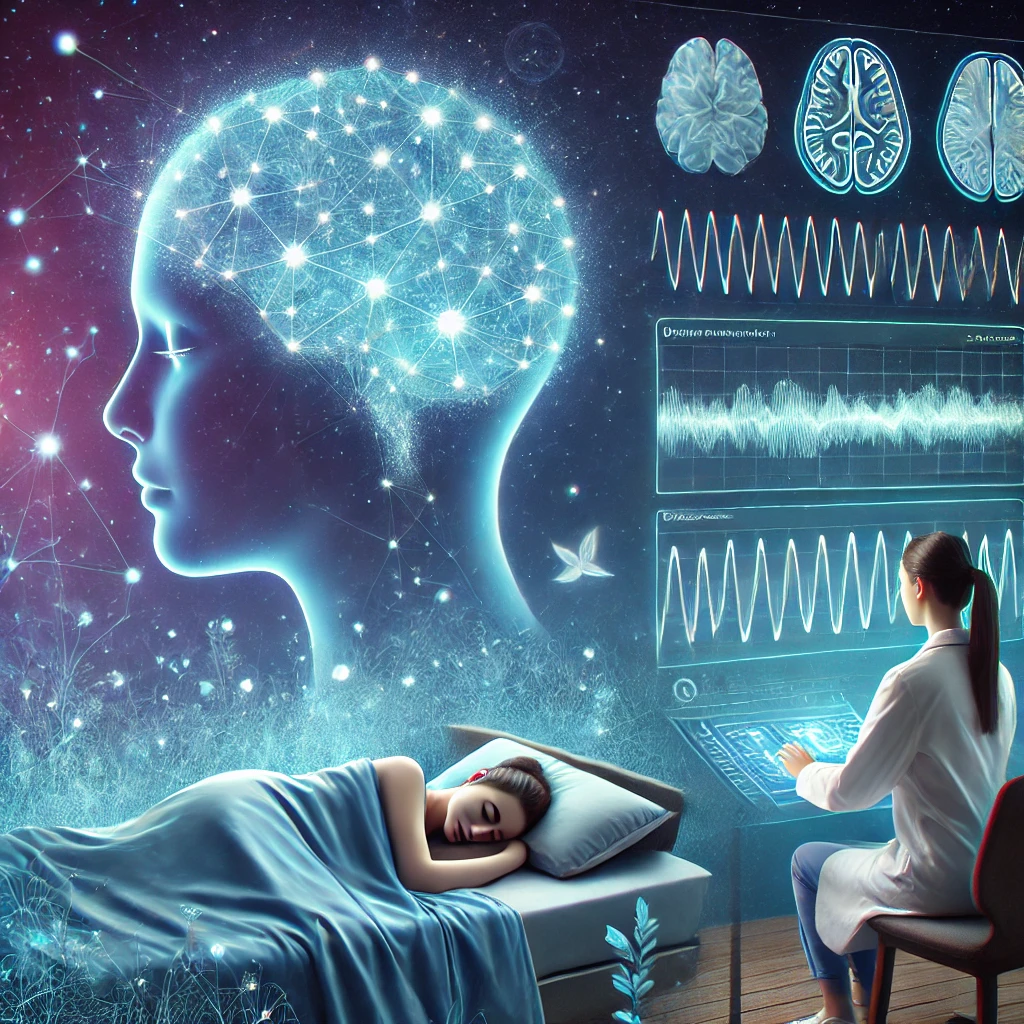Sleep disorders impact millions of people worldwide, leading to poor health, reduced productivity, and diminished quality of life. Traditional methods for diagnosing and treating sleep disorders often face challenges, such as delays in diagnosis, limited access to specialists, and one-size-fits-all treatment approaches. Artificial Intelligence (AI) has emerged as a transformative solution in sleep healthcare, introducing AI sleep disorder diagnosis and personalized sleep care through advanced technologies like intelligent sleep analysis, AI-driven sleep tracking, and automated diagnostic tools for sleep disorders.
This blog will explore how AI is revolutionizing sleep disorder management, providing detailed insights into its applications, benefits, and the steps to implement AI-powered tools in healthcare systems. We will also discuss how AI contributes to personalized treatment plans and address frequently asked questions about AI’s role in sleep healthcare.
Understanding the Scope of Sleep Disorders
Sleep disorders, such as insomnia, sleep apnea, and restless leg syndrome, affect over 50 million Americans annually, according to the American Sleep Association. Untreated sleep disorders can lead to severe consequences, including cardiovascular diseases, obesity, and mental health issues.
The primary challenges in traditional sleep care include:
- Time-Intensive Diagnostics: Polysomnography, a gold-standard diagnostic test, requires overnight stays in sleep labs and manual data analysis.
- Limited Access to Care: Many patients lack access to sleep specialists, especially in rural areas.
- Generic Treatment Approaches: Without personalized care, patients often experience suboptimal outcomes.
AI has addressed these issues by introducing innovative tools and techniques that enhance diagnostic accuracy and enable customized treatment.
How AI Tools Improve Sleep Disorder Diagnosis in Hospitals
AI tools have revolutionized the diagnostic process for sleep disorders by integrating real-time data analysis, predictive modeling, and automation.
Intelligent Sleep Analysis
AI systems analyze extensive datasets, including physiological parameters like heart rate, oxygen saturation, and brain activity, to identify sleep patterns and abnormalities. Intelligent sleep analysis ensures accurate detection of conditions such as sleep apnea and insomnia without requiring labor-intensive manual reviews.
AI-Driven Sleep Tracking
AI-powered devices like smartwatches, sleep bands, and mobile apps provide continuous data collection in natural sleeping environments. These tools:
- Capture detailed metrics, including REM cycles and movement.
- Alert users and healthcare providers to irregularities.
- Provide insights into sleep quality over extended periods.
AI-driven sleep tracking has enabled hospitals to gather data remotely, reducing the burden on in-lab resources and ensuring patients’ comfort.
Automated Diagnostic Tools for Sleep Disorders
Traditional diagnostic methods often involve manual scoring of polysomnography data, which is time-consuming and prone to errors. Automated diagnostic tools powered by AI process this data rapidly and with higher precision. Studies published in Nature Digital Medicine show that AI-assisted diagnostics have improved sleep apnea detection rates by 40% compared to traditional methods.
Integration of these tools into the hospital management system ensures streamlined workflows, better record-keeping, and enhanced collaboration among specialists.
Benefits of AI in Developing Personalized Sleep Treatment Plans
AI’s ability to analyze individual patient data and generate insights has revolutionized the creation of personalized sleep care plans. Personalized sleep care focuses on tailoring interventions to the specific needs of each patient, ensuring higher efficacy and satisfaction.
Customized Interventions
AI evaluates multiple factors, including genetic predispositions, lifestyle habits, and medical history, to design personalized treatment plans. Examples include:
- Optimizing CPAP (Continuous Positive Airway Pressure) settings for sleep apnea patients.
- Identifying behavioral triggers for insomnia and recommending targeted Cognitive Behavioral Therapy for Insomnia (CBT-I).
- Providing specific medication dosages based on patient profiles.
Continuous Monitoring and Feedback
AI tools integrated with wearable devices allow real-time monitoring of patients’ progress. Patients receive actionable feedback, such as:
- Adjustments in bedtime routines.
- Alerts for non-compliance with therapies.
- Suggestions for environmental changes to improve sleep quality.
AI Chatbots in Healthcare for Sleep Support

AI chatbots in healthcare play a crucial role in guiding patients through their treatment journeys. These chatbots:
- Educate users about sleep hygiene.
- Remind patients about therapy schedules, such as using CPAP devices.
- Offer instant responses to queries, reducing the need for frequent clinic visits.
By incorporating AI chatbots into automation in healthcare, providers can enhance patient engagement and adherence to prescribed treatments.
Steps to Implement AI-Powered Tools for Managing Sleep Care
Implementing AI tools in sleep healthcare involves a methodical approach to ensure successful adoption and optimal outcomes.
Step 1: Evaluate Current Processes
Hospitals must assess existing diagnostic and treatment workflows within their hospital management system. Identifying inefficiencies and bottlenecks will highlight areas where AI tools can have the most impact.
Step 2: Select Appropriate AI Solutions
Choose AI tools designed specifically for sleep healthcare, such as:
- AI-powered sleep trackers (e.g., Oura Ring, Fitbit).
- Automated platforms for scoring sleep studies.
- Predictive analytics software for patient-specific treatment planning.
Step 3: Integrate Data Sources
Seamless integration of AI tools with electronic health records (EHR) and existing hospital systems ensures smooth data flow. Automation reduces redundant data entry and improves efficiency.
Step 4: Train Healthcare Teams
Provide comprehensive training to staff, emphasizing the benefits of AI-driven tools and addressing potential resistance to technology adoption.
Step 5: Monitor and Optimize Performance
Regularly evaluate AI systems for accuracy, efficiency, and usability. Continuous optimization ensures that these tools adapt to evolving patient needs and clinical practices.
The Role of Automation in Healthcare for Sleep Management
Automation in healthcare simplifies sleep disorder management by reducing repetitive tasks and enhancing operational efficiency. Key applications include:
- Automated Diagnostics: AI tools process polysomnography data without manual intervention, ensuring consistent and accurate results.
- Streamlined Workflow: Automated appointment scheduling, patient reminders, and data entry improve care delivery.
- Enhanced Data Analysis: AI-enabled platforms analyze large datasets quickly, enabling faster diagnosis and better treatment recommendations.
Integration of automation into hospital systems not only enhances efficiency but also allows healthcare providers to focus on complex clinical decisions.
Real-World Applications of AI in Sleep Healthcare
Philips SmartSleep
Philips SmartSleep leverages AI to analyze user data and provide personalized insights into improving sleep quality. The platform offers tailored advice, making sleep care accessible to individuals outside clinical settings.
Mayo Clinic’s AI-Powered Sleep Labs
The Mayo Clinic uses AI to process polysomnography results, significantly reducing diagnosis time. Patients report better experiences due to faster and more accurate evaluations.
Oura Ring and Digital Health
The Oura Ring combines AI-driven sleep tracking with health analytics to help users identify patterns and improve their sleep hygiene. The device integrates seamlessly with digital health platforms, enabling data sharing with healthcare providers
Enhancing User Experience with AI in Sleep Care
Patients benefit immensely from AI-powered tools that provide timely diagnosis, personalized treatments, and continuous support. The integration of these tools into the hospital management system ensures seamless communication between providers and patients. Additionally, features like AI-driven sleep tracking and chatbots simplify the care process, making it more accessible and engaging.
Clinicians experience reduced workloads as automation in healthcare handles routine tasks like data analysis and scheduling. This allows them to focus on providing high-quality care. Overall, AI in sleep healthcare delivers better outcomes for all stakeholders, transforming the landscape of sleep disorder management.
FAQs on AI and Sleep Disorder Diagnostics
How does AI enhance the accuracy of sleep disorder diagnosis?
AI processes large volumes of data from sleep studies and wearable devices, identifying patterns that may be missed by traditional methods. This improves the accuracy and speed of diagnosis.
Can AI tools create effective personalized treatment plans?
Yes, AI analyzes individual patient data, including medical history and lifestyle factors, to develop tailored treatment plans for specific sleep disorders.
How do AI chatbots support sleep healthcare?
AI chatbots in healthcare assist patients by providing educational resources, therapy reminders, and real-time feedback. They enhance patient engagement and adherence to treatment plans.
Is automation in healthcare relevant to sleep disorder management?
Automation streamlines diagnostic processes, simplifies workflows, and ensures timely treatment, making it highly relevant to managing sleep disorders.




